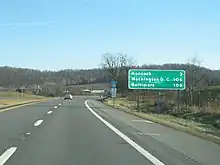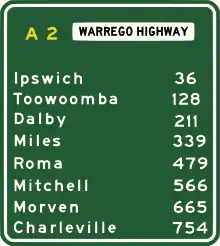A mileage sign, sometimes also called a route confirmation sign in certain contexts, is a type of road sign along highways that displays the distance from the current point on a highway to a certain city, destination, or a junction sign another highway. The destinations listed can range from a short distance away, such as a few miles or kilometers, to long distances away, such as a hundred or couple hundred miles or kilometers away.

Generally, the distance that is calculated for these signs is not the distance to the border or city limits, but rather to the estimated "center" of a city.[1] They also are not calculated by a straight-line from the sign to the city, but instead the distance along the ideally-quickest route to take, taking into account all the turns and curves drivers will take, and the distance may not be perfect. For example, U.S. Route 50, a cross-country route, has a sign in Sacramento, California stating that Ocean City, Maryland, its eastern endpoint, was 3,037 miles (4,888 km) away, whereas a sign in Ocean City once said that Sacramento was 3,073 miles (4,946 km) away.[2]
They are different from reassurance signs which are signs that show the route number(s) of the highway a driver is on. The picture has a mileage sign with a reassurance sign of Interstate 70 in the background. They also differ from mile markers and mile posts, which are usually-small signs on the side of the road show the current length of a numbered highway from the start of its path. The same image also has a mile post with the number "168", showing that Interstate 70 has been running for 168 miles (270 km) in Pennsylvania at that mark.
Functionality

Unlike most road signs, mileage signs are types of highway signs that do not significantly differ across different regions. Countries that follow the European-based Vienna Convention on Road Signs and Signals mostly use symbols on their signs and little text; in contrast, the United States' Manual on Uniform Traffic Control Devices (MUTCD) uses a heavy amount of text accompanied by symbols. Despite this (and since cities and locations cannot be identified by a symbol) the design of mileage signs remains roughly consistent throughout the world,[3] with the only differences being background colors on signs and the different units of measurement (and countries with primary languages written right-to-left like Arabic or Hebrew[4]).
The frequency of mileage signs do differ between rural/countryside areas, cities, and the suburbs. They are much more common in the countryside compared to cities because most drivers simply pass through these regions on a major highway to get to their destination, letting them know how far they are from the nearest major town, village, or city.[5] In contrast, highways in or near urban cities will list locations or junctions with other highways as control cities instead, which differ from mileage signs because they are posted only at gores or exits (or upcoming exits), and do not give the distance to them.[6] Mileage signs may be seen exiting a city, but typically are not used inside or entering a control city.
References
- ↑ Garlock, Stephanie (June 27, 2014). "The Sign Says You've Got 72 Miles to Go Before the End of Your Road Trip. It's Lying". Bloomberg.com. Retrieved September 6, 2023.
- ↑ "The Sign Battle Saga". Coast to Coast on US 50. Retrieved September 6, 2023.
- ↑ Grobaty, Tim (June 24, 2020). "Don't believe everything you read on a signpost". Long Beach Post News. Retrieved September 8, 2023.
- ↑ "Saudi Arabia Road Traffic Signs" (PDF). adcidl.com. Retrieved September 7, 2023.
- ↑ Rookhuyzen, David (January 22, 2020). "Are we there yet? A guide to highway distance signs". Arizona Department of Transportation. Retrieved September 8, 2023.
- ↑ Jennings, Ken (2011). Maphead: Charting the Wide, Weird World of Geography Wonks. New York: Scribner. p. 168. ISBN 9781439167199. Retrieved July 21, 2020.